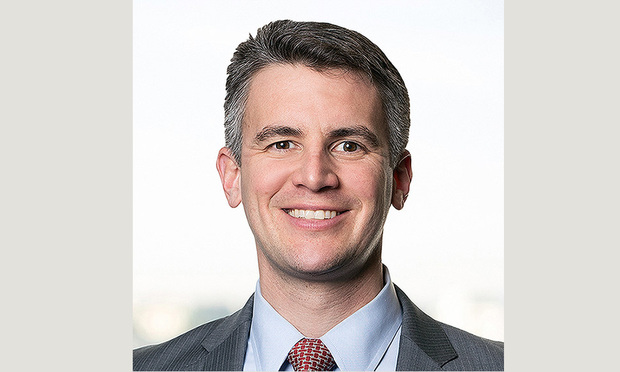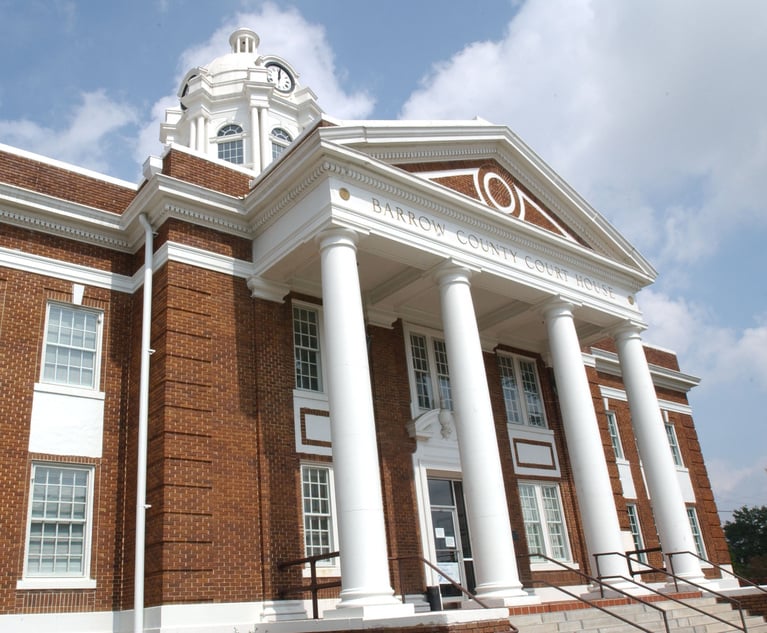Distinguished Leader: Rob Fortson
"What interested me most was the business side of education, maximizing available resources to reform the system and make it work better for kids. "
June 19, 2019 at 02:00 PM
4 minute read
 Rob Fortson, McGuire Woods, Atlanta (Photo: John Disney/ALM)
Rob Fortson, McGuire Woods, Atlanta (Photo: John Disney/ALM)
Rob Fortson, a partner at McGuireWoods and senior vice president at its consulting arm, served as a Teach for America corps member in Baltimore City Public Schools and later worked at the U.S. Department of Education.
He now represents schools in Georgia on legal, policy, regulatory and business matters. In several recent cases, Fortson and his team identified millions of dollars in funding deficits and helped clients restore these funds from the local school district. One case led to an out-of-court effort that recovered almost $1 million in annual funding for his clients' schools.
At McGuireWoods Consulting, Fortson has worked with a coalition to increase funding for all of Georgia's charter schools.
What was serving in Teach for America like?
Teaching high school English in Baltimore was the hardest and most rewarding job I've ever had. Every day felt like an accomplishment. It is the only career I can think of that would allow a 22-year-old with no prior experience to supervise 120 people on a daily basis. I felt the weight, and often the guilt of being the only English instructor my students would have for the year. It was a tremendous responsibility and taught me how to be a strong leader, communicator and motivator.
Teach For America provided a path for me to enter the teaching profession, a career that I likely wouldn't have otherwise considered much less had the courage to pursue. TFA also gave me a community and a support network. I lived with fellow corps members throughout my time in Baltimore, and they are still some of my closest friends. We carried each other's burdens as we learned how to be professional educators in a large urban school district.
Did you go to law school with the goal of working on education law?
Yes, I had been interested in the policy of education prior to joining TFA. However, it took me a long time to figure out how to make a career as an education lawyer. Traditionally, a legal practice in education involves representing school districts or departments of education, primarily as an adviser on compliance issues.
What interested me most, however, was the business side of education, maximizing available resources to reform the system and make it work better for kids. Advising charter schools offers that opportunity, because I'm able to partner with educational innovators, often from the school's inception, and help them navigate the challenges of operating a heavily regulated small business without compromising the vision/mission of their academic model.
What is a common misconception about charter schools?
One common misconception about charter schools is that they are private schools or that they can pick and choose which kids to enroll. State and federal law requires a charter school to accept any applicant as long as space is available. Moreover, charter schools are held accountable for their racial and socioeconomic diversity. Thus, if a charter school's student demographics do not reflect the diversity of its attendance zone, the school is expected to bolster recruitment efforts and target underserved populations.
Another misconception is that the closure of some charter schools is evidence that the model is flawed or should be abandoned. Charters are by definition designed to offer innovation that is unavailable in the traditional academic setting. As with any other industry, attempts to break new ground are not always successful. The value that charters bring to the educational ecosystem is this disruptive innovation and outside-the-box strategies for improving student outcomes.
This content has been archived. It is available through our partners, LexisNexis® and Bloomberg Law.
To view this content, please continue to their sites.
Not a Lexis Subscriber?
Subscribe Now
Not a Bloomberg Law Subscriber?
Subscribe Now
NOT FOR REPRINT
© 2025 ALM Global, LLC, All Rights Reserved. Request academic re-use from www.copyright.com. All other uses, submit a request to [email protected]. For more information visit Asset & Logo Licensing.
You Might Like
View All
From 'Confusing Labyrinth' to Speeding 'Roller Coaster': Uncertainty Reigns in Title IX as Litigators Await Second Trump Admin
6 minute read
University of Georgia School of Law Finds Next Dean on Its Own Faculty
3 minute read
Teen Charged in Barrow School Shooting and His Father to Stay in Custody After Hearings
5 minute readTrending Stories
- 1'It's Not Going to Be Pretty': PayPal, Capital One Face Novel Class Actions Over 'Poaching' Commissions Owed Influencers
- 211th Circuit Rejects Trump's Emergency Request as DOJ Prepares to Release Special Counsel's Final Report
- 3Supreme Court Takes Up Challenge to ACA Task Force
- 4'Tragedy of Unspeakable Proportions:' Could Edison, DWP, Face Lawsuits Over LA Wildfires?
- 5Meta Pulls Plug on DEI Programs
Who Got The Work
Michael G. Bongiorno, Andrew Scott Dulberg and Elizabeth E. Driscoll from Wilmer Cutler Pickering Hale and Dorr have stepped in to represent Symbotic Inc., an A.I.-enabled technology platform that focuses on increasing supply chain efficiency, and other defendants in a pending shareholder derivative lawsuit. The case, filed Oct. 2 in Massachusetts District Court by the Brown Law Firm on behalf of Stephen Austen, accuses certain officers and directors of misleading investors in regard to Symbotic's potential for margin growth by failing to disclose that the company was not equipped to timely deploy its systems or manage expenses through project delays. The case, assigned to U.S. District Judge Nathaniel M. Gorton, is 1:24-cv-12522, Austen v. Cohen et al.
Who Got The Work
Edmund Polubinski and Marie Killmond of Davis Polk & Wardwell have entered appearances for data platform software development company MongoDB and other defendants in a pending shareholder derivative lawsuit. The action, filed Oct. 7 in New York Southern District Court by the Brown Law Firm, accuses the company's directors and/or officers of falsely expressing confidence in the company’s restructuring of its sales incentive plan and downplaying the severity of decreases in its upfront commitments. The case is 1:24-cv-07594, Roy v. Ittycheria et al.
Who Got The Work
Amy O. Bruchs and Kurt F. Ellison of Michael Best & Friedrich have entered appearances for Epic Systems Corp. in a pending employment discrimination lawsuit. The suit was filed Sept. 7 in Wisconsin Western District Court by Levine Eisberner LLC and Siri & Glimstad on behalf of a project manager who claims that he was wrongfully terminated after applying for a religious exemption to the defendant's COVID-19 vaccine mandate. The case, assigned to U.S. Magistrate Judge Anita Marie Boor, is 3:24-cv-00630, Secker, Nathan v. Epic Systems Corporation.
Who Got The Work
David X. Sullivan, Thomas J. Finn and Gregory A. Hall from McCarter & English have entered appearances for Sunrun Installation Services in a pending civil rights lawsuit. The complaint was filed Sept. 4 in Connecticut District Court by attorney Robert M. Berke on behalf of former employee George Edward Steins, who was arrested and charged with employing an unregistered home improvement salesperson. The complaint alleges that had Sunrun informed the Connecticut Department of Consumer Protection that the plaintiff's employment had ended in 2017 and that he no longer held Sunrun's home improvement contractor license, he would not have been hit with charges, which were dismissed in May 2024. The case, assigned to U.S. District Judge Jeffrey A. Meyer, is 3:24-cv-01423, Steins v. Sunrun, Inc. et al.
Who Got The Work
Greenberg Traurig shareholder Joshua L. Raskin has entered an appearance for boohoo.com UK Ltd. in a pending patent infringement lawsuit. The suit, filed Sept. 3 in Texas Eastern District Court by Rozier Hardt McDonough on behalf of Alto Dynamics, asserts five patents related to an online shopping platform. The case, assigned to U.S. District Judge Rodney Gilstrap, is 2:24-cv-00719, Alto Dynamics, LLC v. boohoo.com UK Limited.
Featured Firms
Law Offices of Gary Martin Hays & Associates, P.C.
(470) 294-1674
Law Offices of Mark E. Salomone
(857) 444-6468
Smith & Hassler
(713) 739-1250







